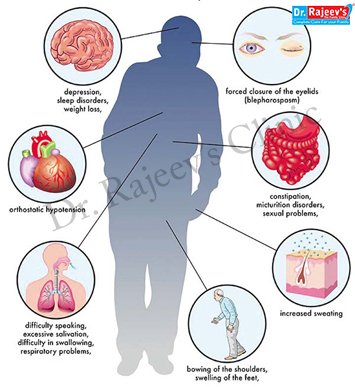

Parkinson’s disease also called paralysis agitans or shaking palsy is a movement disorder. Cases of PD are reported at all ages, though it is uncommon in people younger than 40.This disease is more common among men and usually occurs after 60 years.The average age at which symptoms begin in the USA. is 58-60.
The nerve cells in the part of the brain which control movements are mainly affected. The nerve cells (neurons) which make the chemical called dopamine either do not work sufficiently or are completely destroyed. The real cause behind this had never been identified. Though, many risk factors have been enumerated in literature.
Persons suffering from Parkinson’s disease need not present with every common symptom. The number of symptoms and their intensities are known to vary with every individual. Most common signs & symptoms of Parkinson’s include:
Tremors - Felt in the fingers, hands, arms, legs, jaw and face. Initially these tremors are mild and visible only while resting. Eventually they become visible even during routine movements.
Rigidity - Persons suffering often feel stiffness or inflexibility in their muscles. Muscles normally stretch when they move, and then relax when they are at rest. In rigidity, the muscle tone of an affected limb is always stiff and does not relax, sometimes resulting in a decreased range of motion.
Stiffness - Muscular movement like walking, running, dancing, sitting, grasping objects with fingers all seem very stiff. Rigidity can cause pain and cramping. The sense of fluidity in these movements is lost. In advanced conditions, even the facial muscles become very rigid, thus giving an appearance of an expressionless face, something akin to wearing a mask.
Bradykinesia - There is slowness of movements usually accompanies the sensation of stiffness and rigidity. A person with bradykinesia will probably also have incomplete movements, difficulty initiating movements and sudden stopping of ongoing movement.
There is increasing inability to perform tasks which require rapid alternating movements.
Loss of balance and in coordination of movements results in frequent falls when beginning to walk or run.
Gait - There is a ‘shuffling’ gait characterized by short steps, with feet barely leaving the ground, producing an audible shuffling noise. Small obstacles tend to trip the patient.
Decreased arm swing - Turning ‘en-bloc’, rather than the usual twisting of the neck and trunk and pivoting on the toes, PD patients keep their neck and upper body rigid, requiring multiple small steps to accomplish a turn. Stooped, forward-flexed posture both when sitting and standing.
Festination - A combination of stooped posture, imbalance, and short steps. It leads to a gait that gets progressively faster and faster, often ending in a fall.
Dystonia - Abnormal, sustained, painful twisting muscle contractions, usually affecting the foot and ankle, interfering with gait. However, dystonia can be quite generalized, involving a majority of skeletal muscles; such episodes are very painful and completely disabling.
They may go through periods of "freezing", which is when a person feels stuck to the ground and finds it difficult to start walking. The slowness and incompleteness of movement can also affect speaking and swallowing.
Speech - the voice becomes very soft. Later, the sound turns hoarse and monotonous. Occasionaly, the speech becomes excessively rapid, soft, and poorly-intelligible.
Gradual progress in the disorder causes an inability to understand the meaning & essence of speech. Also, there is difficulty in deciphering the facial expressions seen on others when conversing.
Drooling : Weak swallowing and stooped posture causes drooling of saliva.
 More symptoms :
More symptoms :
These symptoms certainly vary in intensities in different persons. They are seen as the disease progresses and everyone do not suffer from all of them.
The exact cause of Parkinson's Disease occurs. These are some factors that scientists believe predisposes individuals to PD.
Currently no blood or laboratory tests that have been proven to help in diagnosing PD. It is difficult to diagnose PD accurately. Thus, medical history and a neurological examination alone guide the physician in diagnosing.
CAUSTICUM : Useful medicine for parkinson’s Disease with excessive rigidity.Useful for the muscles which get hardened, leading to extreme body stiffness.There is great difficulty in maintaining balance while walking,Patient walk slowly but have a tendency to fall easily. Very helpful when there is great difficulty in getting up from a sitting or lying position.Most suited when there is trembling of hands
GELSEMIUM : Useful medicine for Parkinson’s disease of nervous origin.Helpful for nervous and sensitive patients who get excited very easily from a sudden fear or emotions. There is vigorous shaking of hands or the shaking of legs or tongue which is accompanied by excessive weakness and the condition gets worse by sudden mental excitement
PLUMBUM MET : Useful for Parkinson’s Disease with marked Bradykinesia or slowness in movement. Given when the body muscles work at a very slow pace and in a very sluggish manner.There is slowness which is always accompanied by wasting or emaciation of the affected muscles.
MERC SOL : Useful for Parkinson’s Disease with vigorous trembling of hands. There is shaking of hands. The drooling of saliva from the mouth in patients of Parkinson’s Disease can be wonderfully controlled with medicine Mercurius Solubilis.There is trembling of the tongue with difficulty in talking accompanied by an offensive odor emanating from the mouth. There is a general worsening of symptoms at night.
ZINCUM MET : Very helpful medicine for Parkinson’s Disease with tremors of hand. Useful to provides strength to the weakened nerve.Usefull when there is constant movement of feet.
NEUROPLUS